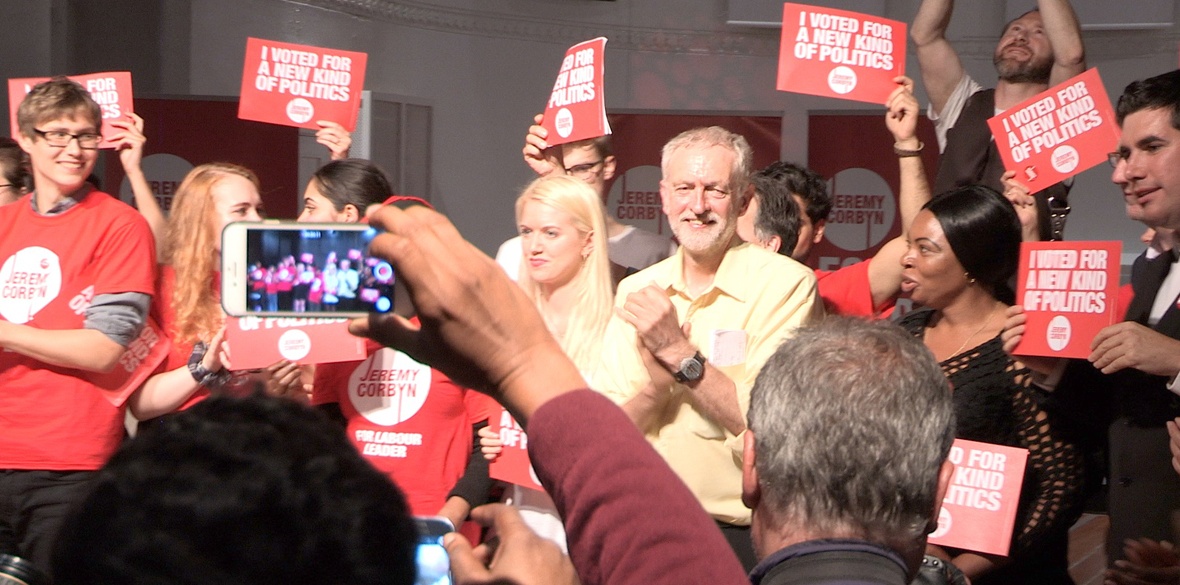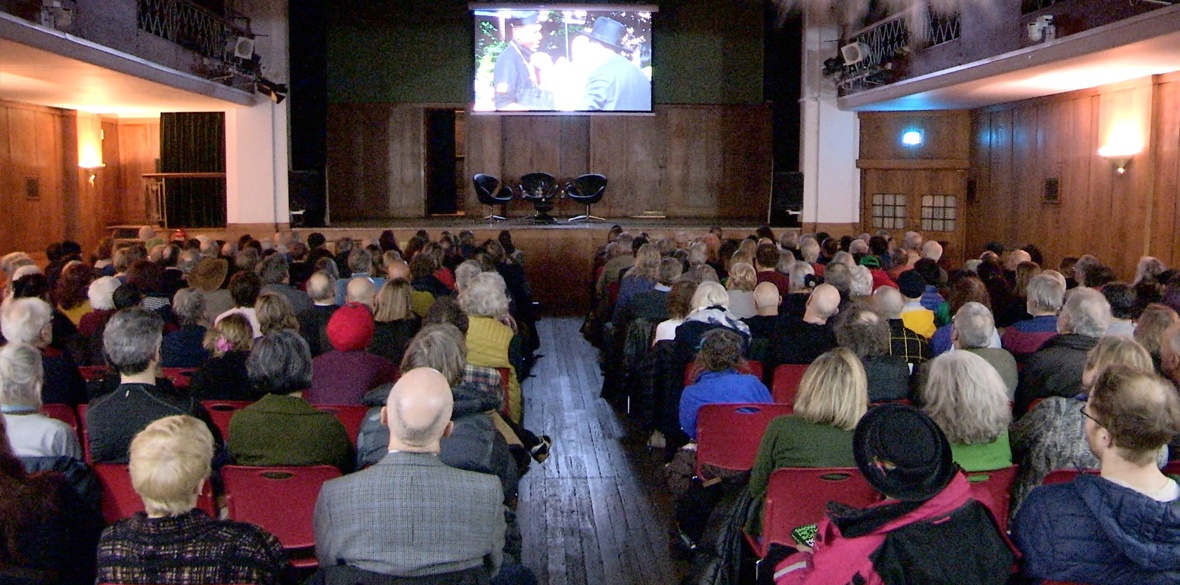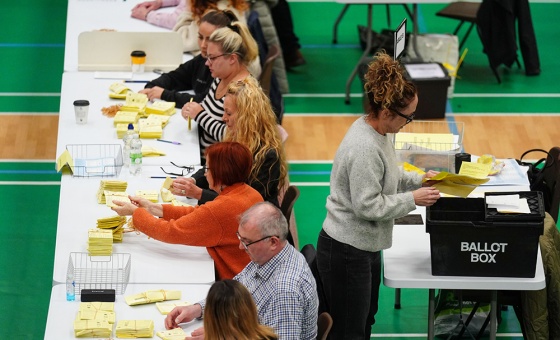This is the last article you can read this month
You can read more article this month
You can read more articles this month
Sorry your limit is up for this month
Reset on:
Please help support the Morning Star by subscribing here
“OH JEREMY CORBYN – The Big Lie” is the film the people controlling the Labour Party do not want you to see.
Labour councillors in Swansea have been banned from seeing it. A community centre in Carlisle has suddenly dropped it. Most outrageously of all the TUC have decreed that it should not be shown during the annual Tolpuddle Martyrs festival this summer. They say it does not fit with their “values” — undefined.
But these are only the acts of censorship which have become public.
Behind the scenes many more underhand things have been done to stop people seeing it and venues from screening it, including threats of punishment, protests and withdrawal of grants.
And who are the driving force behind all this censorship? The tiny right-wing clique who now call the shots in Labour.
They seem to believe that the film exposes a truth, and a truth that might destroy them if enough people see what it is. And they are absolutely right.
Can you describe the political content?
This film is less about politics and more about injustice on an epic scale.
Jeremy Corbyn threatened the establishment and in reply the establishment, including most of his own parliamentary party, set out to crush him with the most horrific smears and lies.
Along with this went an unprecedented McCarthyite witch-hunt against the people who supported Corbyn – a vicious witch-hunt which is still going on. It makes a mockery of our democracy, but most of all it exposes our mainstream media as a pitiful sham and Establishment poodle for not reporting it.
It’s enough to make a person feel ashamed to be called a journalist.
What difficulties have you encountered screening it through conventional channels?
The process of trying to get the film screened has actually been more revealing than the process of making it.
Everything started well. The film had a packed global premiere in the historic Babylon Cinema in Berlin in January. The audience was hugely enthusiastic.
But finding somewhere for its first UK outing was much harder. We didn’t, of course, expect the big cinema chains to show it, but what shocked us was the reaction of cinemas known for screening radical films. They just didn’t want to touch a film about Jeremy Corbyn.
The subject, they felt, was just too controversial, too dangerous.
Can you describe how you have overcome that, and where you are now?
The breakthrough for screening the film came in February when London’s Conway Hall accepted our booking. The hall was packed out — 400 people — a sell-out audience. The audience told us they wanted it on TV, in their local cinemas, everywhere.
But I told them, that the only way the film was going to get any further than the Conway Hall was if THEY took it on, if they did the screening. Amazingly, they did.
Who are your supporters, and how have you found audiences?
Our strongest supporters are those the Labour Party have treated unfairly and with contempt. These are those who have been expelled, the people who’ve left in disgust, and the people who are fighting on. Those same people are the people who are finding us our audiences. They are the people who are getting it screened from Penzance to Glasgow and who are organising more screenings every day of the week.
The way it works is this: people find out about the film on social media and ask us when it’s going to be screened where they are.
Our answer is, go and organise your own screening — all you need is somewhere with seats, a projector and a screen. And more often than not they go away and they do it. This is the marvellous thing.
An extraordinary grassroots movement almost got Jeremy Corbyn elected prime minister in 2017. That same movement has now got behind the film and they are screening it in cinemas, in meeting halls, in pubs, in art galleries, in churches — anywhere and everywhere.
What reactions have you had?
The overwhelming reaction we get from people who’ve seen the film is one of thanks.
People are really, really grateful we’ve done this. And they’re grateful because we’ve tried to put into an 80 minute film a fantastically important political story which they’re a part of.
It’s a story which they think hasn’t ended yet and which they are committed to continuing. Overshadowing all their reactions is a huge anger against Keir Starmer and what he’s done to the Labour Party.
There are many left-wing films of high quality produced in Britain that struggle with political censorship in the conventional channels. Is the path you have found for The Big Lie a viable alternative to the mainstream?
I think we have made a start on creating a viable alternative to the mainstream, but it’s only a start.
We need more regular shows on the internet, more interaction, and more analysis of what we’re being fed by the mainstream.
But overwhelmingly what we have to do is to find ways to break through the echo chambers — get to the people who don’t know what’s going, the sort of people who are shocked to the core when they see our film.
Only when we’ve built a path to those people will we have a viable alternative to the mainstream. And that will be a real breakthrough.
The challenge presented to “revolutionary cinema”, such as that in Argentina in the 1960s and ’70s is how to do distribution, and how to engage with a mass audience. They nevertheless succeeded with films like The Hour of the Furnaces (La Hora de los Hornos). Do you consider that the kind of support, network and screenings you have achieved might be a template in the UK for such films and such a network?
I think what we’re doing with “Oh Jeremy Corbyn” might be the template for all kinds of revolutionary films — fiction and non-fiction.
But in saying that we have to put a lot of thought into the kinds of films we try to put on the network. We need films which are open to everyone, not just to the usual suspects or the people in the know — but to everyone — young, old, all ethnicities, all capabilities, all disabilities — all who need and want radical change, and then to help them understand how to achieve that change.
The new network we are creating will WANT to share those films and then will share them, just like they are sharing our film. And that will be revolutionary.
Are you willing to help others to reach the same audiences and aim for similar political goals?
Yes, of course, but those we work with have to realise the importance of the grassroots movement who are now screening “Oh Jeremy Corbyn”. They have to realise the way this film is being distributed is more important than the film itself.
It’s relatively easy to make a film, to put it on YouTube and scatter it around the social media, but all too often you’re setting it adrift in a vast sea of other videos, among all kinds of stuff from the most barmy conspiracy theories to pictures of kittens.
But, by contrast, when people get a film and screen it and watch it and talk about it — that’s very different. It’s a collective experience. It gathers people together to discuss the way forward and debate what to do next.
This is the way to take our movement forward.
It will maybe even help us get the shocking truth out there about what really happened to Jeremy Corbyn.
For latest information about where you can see “Oh Jeremy Corbyn — The Big Lie” email [email protected]










